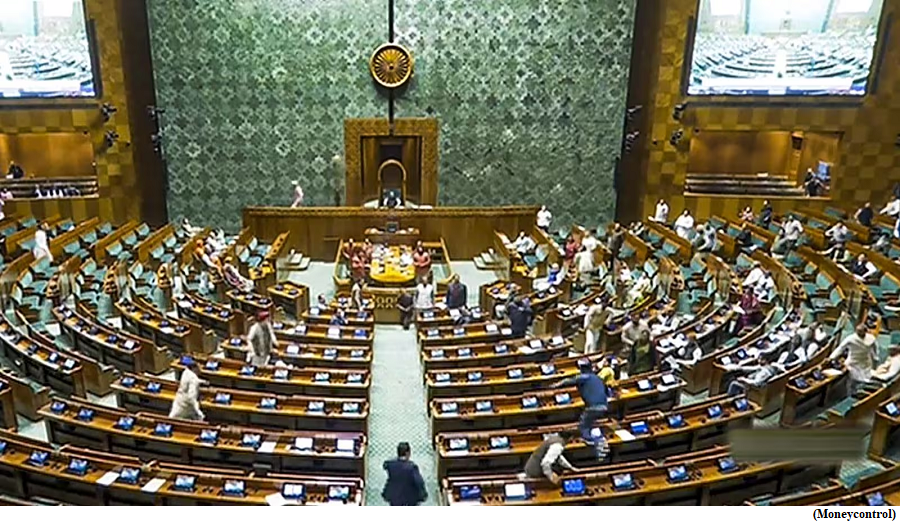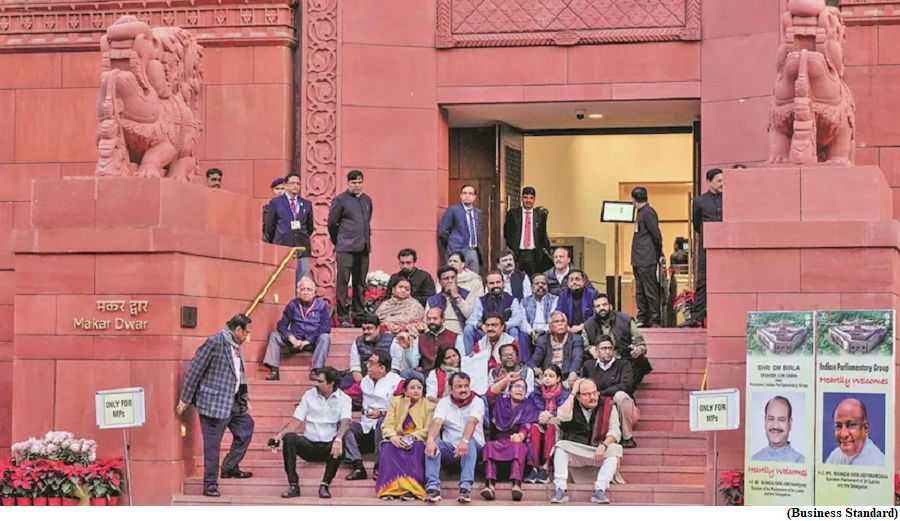Parliament passes Bill to raise cap on age of GSTAT president, members (GS Paper 2, Governance)

Why in news?
- Parliament recently passed a bill to raise the age cap of president and members of the GST Appellate Tribunals.
- Rajya Sabha returned the Central Goods and Services Tax (Second Amendment) Bill, 2023 to Lok Sabha without any changes, thus completing the Parliamentary procedure for the bill.
Key Highlights:
- The bill, approved by Parliament, seeks to raise the cap on age for president and members of the GST Appellate Tribunals (GSTAT) to 70 years and 67 years, respectively.
- Currently, the age limit for the president is 67 years and for members is 65 years.
- The bill also aims to align the provisions of the Central GST Act in line with the Tribunal Reforms Act, 2021.
- Among others, with the latest changes, an advocate with 10 years of 'substantial experience' in litigation in matters relating to indirect taxes in an appellate tribunal, would be eligible to be appointed as a judicial member of the GSTAT.
Benches:
- GSTAT will have one principal bench based in New Delhi, with a President and one judicial and technical member each.
- The state benches of GSTAT will have a president and two judicial members and two technical members (one each from Centre and states).
- Setting up of state-level benches of GSTAT would help businesses by way of faster dispute resolution.
The Provisional Collection of Taxes Bill 2023:
- The Provisional Collection of Taxes Bill 2023, which was passed by the Lok Sabha, will give immediate effect to the changes in customs and excise duties announced in the Budget.
- The Bill seeks to obtain the authority from Parliament to provisionally levy and collect the newly imposed or increased duties of customs and excise for 75 days.
- While the changes in rates of income and corporate taxes, incorporated in the Budget announced on February 1, are effective from April 1 or a notified date, most of the changes in customs and excise duty rates become effective from midnight.
- This Bill proposes to replace the erstwhile Provisional Collection of Taxes Act, 1931 with a minor change that is technical in nature.
Restrictions imposed on suspended MPs
(GS Paper 2, Governance)
Why in news?
- Recently, the Lok Sabha and Rajya Sabha collectively suspended 141 MPs, 95 from the Lok Sabha and 46 from the Rajya Sabha till at least the remainder of the ongoing Winter Session, deepening the crisis in the Parliament where some crucial bills were tabled, briefly discussed, and passed.
- The bone of contention remained the Opposition’s demand that Union Home Minister Amit Shah speak in the Parliament and that a discussion be held on the December 13 security breach, in which two individuals broke into the Lok Sabha and set off smoke cannisters on the floor of the House.

List of restrictions:
- The Lok Sabha Secretariat has issued a circular detailing strict measures against 49 recently suspended Opposition MPs.
- These restrictions encompass various aspects of Parliamentary functioning, significantly affecting the MPs' roles and responsibilities.
- The suspended members are now barred from entering the Parliament chamber, its lobby and galleries. This restriction extends to their participation in sittings of Parliamentary Committees, where they hold membership. Any business listed under their names or notices tabled by them will not be considered during the suspension period either.
- No notice tabled by them is acceptable during the period of their suspension. They cannot vote at elections to committees held during the period of their suspension.
- The circular specifies that the MPs will not receive their daily allowance for the duration of the suspension. This decision is in accordance with the Salary, Allowances and Pensions of Members of Parliament Act, 1954.
- It implies that their stay at the place of duty cannot be considered a residence on duty under the said Act.
What is the process of suspension of MPs?
- As a general principle, it is the role and duty of the Presiding Officer; Speaker of Lok Sabha and Chairman of Rajya Sabha to maintain order so that the Parliament House can carry out its duties smoothly.
- To ensure this, the House presiding officers are empowered to force a member to withdraw from the House.
What happens to a suspended MP?
- The Member of Parliament, who stands suspended by the order of the leader of the House, is barred from entering the Rajya Sabha or Lok Sabha chambers. Furthermore, they cannot attend the meetings of committees.
- Additionally, suspended MPs are not eligible to give notice for discussion or submission, and they also lose the right to get a reply to their questions, if any.
- The period of suspension in either house cannot exceed the remainder of the ongoing session.
Is there any method of recourse available to them?
- The suspension can be terminated by a motion in the Parliament House.
- However, suspended MPs cannot demand a court intervention, as under Article 122 of the Indian Constitution, parliamentary proceedings cannot be questioned before a court.



